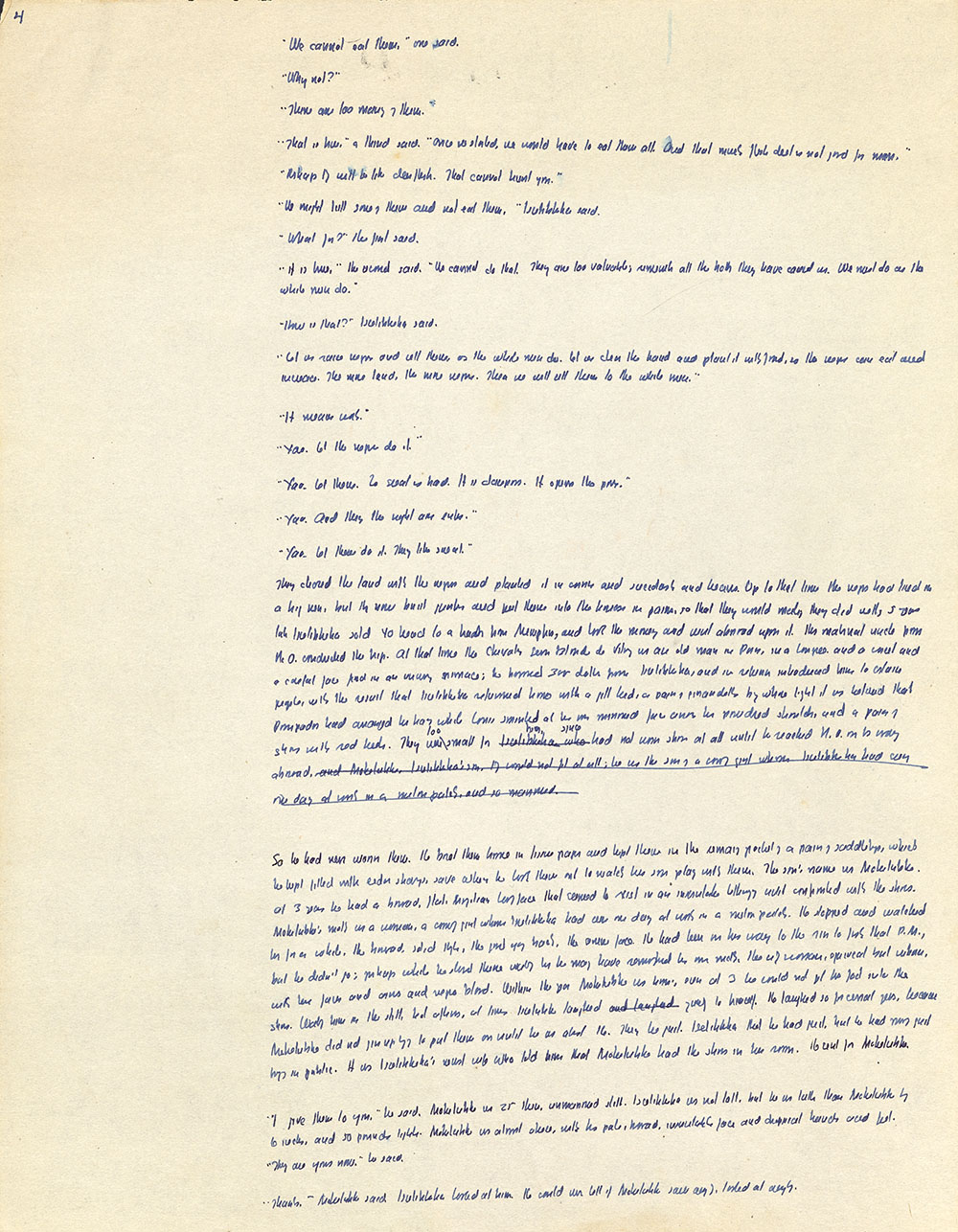TRANSCRIPTION
"We cannot eat them," one said.
"Why not?"
"There are too many of them."
"That is true," a third said. "Once we started, we would have to eat them all. And that much flesh diet is not good for man."
"Perhaps they will be like deer flesh. That cannot hurt you."
"We might kill some of them and not eat them," Issetibbeha said.
"What for?" the first said.
"It is true," the second said. "We cannot do that. They are too valuable; remember all the bother they have caused us. We must do as the
white men do."
"How is that?" Issetibbeha said.
"Let us raise negroes and sell them as the white men do. Let us clear the land and plant it with food, so the negroes can eat and
increase. The more land, the more negroes. Then we will sell them to the white men."
"It means work."
"Yao. Let the negroes do it."
"Yao. Let them. To sweat is hard. It is dangerous. It opens the pores."
"Yao. And then the night air enters."
"Yao. Let them do it. They like sweat."
They cleared the land with the negroes and planted it in corn and succetash and beans. Up to that time the negros had lived in
a big pen, but they now built quarters and put them into the houses in pairs, so that they would mate; they did well; 5 years
later Issetibbeha sold 40 head to a trader from Memphis, and took the money and went abroad upon it. His maternal uncle from
N.O. conducted the trip. At that time the Chevalier Soeur Blonde de Vitry was an old man in Paris, in a toupee and a corset and
a careful face fixed in an [illegible] grimace; he borrowed 300 dollars from Issetibbeha, and in return introduced him to certain
people, with the result that Issetibbeha returned home with a gilt bed, a pair of girandelles by whose light it was believed that
Pompador had arranged her hair while Louis smirked at his mirrored face across her powdered shoulder, and a pair of
shoes with red heels. There were too small for <Issetibbeha, who> him since had not worn shows at all until he reached N.O. on his way
abroad. <and Moketubbe, Issetibbeha's son, they would not fit at all; he was the son of a comely girl whom Issetibbeha had seen
one day at work in a melon patch, and so married.>
So he had never worn them. He brought them home in tissue paper and kept them in the remaining pocket of a pair of saddlebags, which
he kept fitted with cedar shavings, save when he took them out to watch his son play with them. The son's name was Moketubbe.
At 3 years he had a broad, flat, Mongolian face that seemed to exist in an inscrutable lethargy until confronted with the shoes.
Moketubbe's mother was a [woman?], a comely girl whom Issetibbeha had seen one day at work in a melon patch. He stopped and watched
her for a while, the broad, solid thighs, the good [young?] back, the serene face. He had been on his way to the river to fish that P.M.,
but he didn't go; perhaps while he stood there watching her he may have remembered his own mother, the city woman, [illegible] but urban,
with her fans and [airs?] and negro blood. Within the year Moketubbe was born; even at 3 he could not get his feet into the
shoes. Watching him in the still, hot afternoons, at times Issetibbeha laughed <and laughed> quietly to himself. He laughed so for several years, because
Moketubbe did not give up trying to put them on until he was about 16. Then he quit. Issetibeha thought that he had quit, but he had merely quit
trying in public. It was Issetibbeha's newest wife who told him that Moketubbe had the shoes in his room. He sent for Moketubbe.
"I give them to you," he said. Moketubbe was 25 then, unmarried still. Issetibbeha was not tall, but he was taller than Moketubbe by
6 inches, and 50 pounds lighter. Moketubbe was almost obese, with his pale, broad, inscrutable face and dropsical hands and feet. "They are yours now," he said.
"Thanks," Moketubbe said. Issetibbeha looked at him. He could not tell if Moketubbe saw anything, looked at anything.
|


